Money
Money is a way for people to exchange goods and services. It comes in different forms, such as coins and paper bills, and is used to measure the value of items, pay for goods and services, and save for later use.
Types of Money
There are different types of money, including:
- Coins: Small, metal currency with different values, such as pennies, nickels, dimes, and quarters.
- Paper Bills: Printed currency in different denominations, such as $1, $5, $10, $20, and so on.
- Digital Money: Money that exists in digital form, such as credit cards, debit cards, and online payment systems like PayPal and Venmo.
Understanding the Value of Money
Money has value, and it is important for people to understand its worth. Some key concepts related to the value of money include:
- Counting Money: Learning to count and add different coin and bill values together.
- Equivalent Values: Understanding that different combinations of coins and bills can have the same total value (for example, four quarters have the same value as one dollar).
- Exchange Rates: Understanding the value of money in different currencies and how it can change when exchanging between them.
Using Money
People use money in various ways, including:
- Buying Goods and Services: Using money to purchase items like food, clothing, and toys, as well as services like haircuts and car repairs.
- Saving and Budgeting: Setting aside money for future needs or wants, and learning to manage a budget for daily expenses.
- Investing: Putting money into assets like stocks, bonds, or real estate to potentially earn a return on investment.
Conclusion
Money plays a crucial role in our daily lives, and understanding its value and how to use it wisely is an important skill for everyone. Whether it's counting coins, learning about financial literacy, or making responsible spending choices, money is a fundamental aspect of our society.
.◂Math Worksheets and Study Guides Second Grade. Money
Study Guide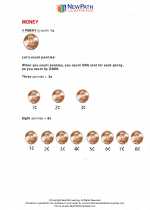 Money
Money  Worksheet/Answer key
Worksheet/Answer key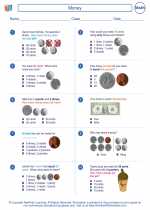 Money
Money  Worksheet/Answer key
Worksheet/Answer key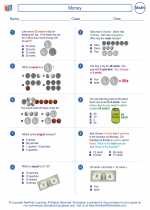 Money
Money  Worksheet/Answer key
Worksheet/Answer key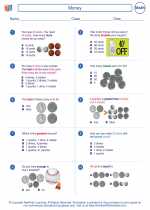 Money
Money  Worksheet/Answer key
Worksheet/Answer key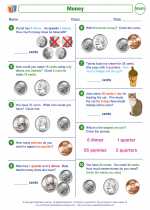 Money
Money  Worksheet/Answer key
Worksheet/Answer key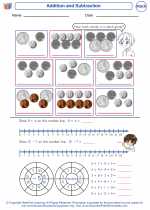 Addition and Subtraction
Addition and Subtraction  Worksheet/Answer key
Worksheet/Answer key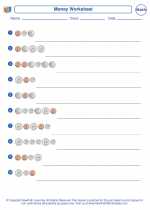 Money
Money  Vocabulary/Answer key
Vocabulary/Answer key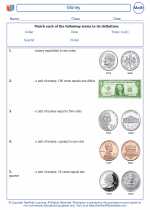 Money
Money 

 Worksheet/Answer key
Worksheet/Answer key
 Worksheet/Answer key
Worksheet/Answer key
 Worksheet/Answer key
Worksheet/Answer key
 Worksheet/Answer key
Worksheet/Answer key
 Worksheet/Answer key
Worksheet/Answer key
 Worksheet/Answer key
Worksheet/Answer key
 Vocabulary/Answer key
Vocabulary/Answer key

Create And Print more Money Skills worksheets with Money Skills Worksheets generator
The resources above cover the following skills:
Number Sense, Properties, and Operations
Formulate, represent, and use strategies to add and subtract within 100 with flexibility, accuracy, and efficiency. Students can:
Represent and solve problems involving addition and subtraction. (CCSS: 2.OA)
Apply addition and subtraction concepts to financial decision making (PFL).